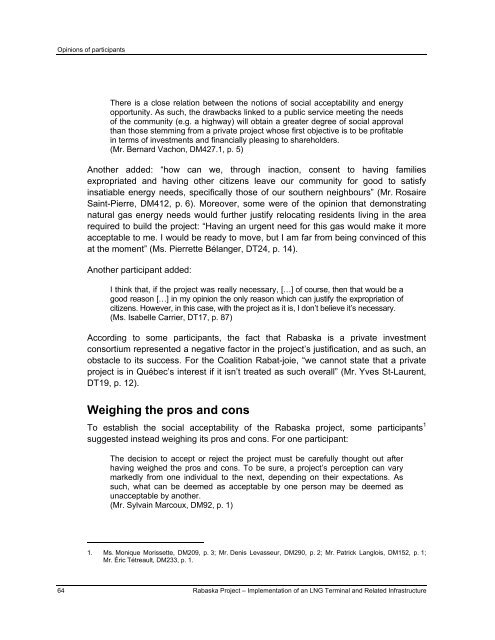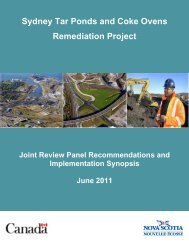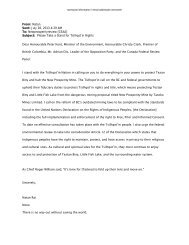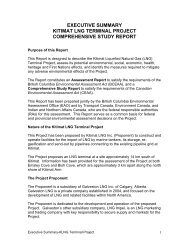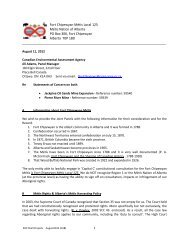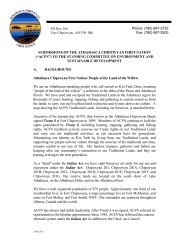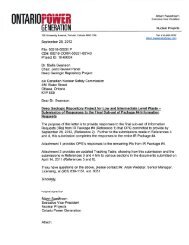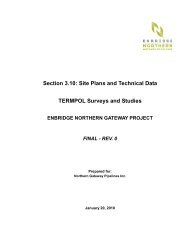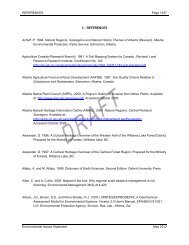Report - Agence canadienne d'évaluation environnementale
Report - Agence canadienne d'évaluation environnementale
Report - Agence canadienne d'évaluation environnementale
Create successful ePaper yourself
Turn your PDF publications into a flip-book with our unique Google optimized e-Paper software.
Opinions of participants<br />
There is a close relation between the notions of social acceptability and energy<br />
opportunity. As such, the drawbacks linked to a public service meeting the needs<br />
of the community (e.g. a highway) will obtain a greater degree of social approval<br />
than those stemming from a private project whose first objective is to be profitable<br />
in terms of investments and financially pleasing to shareholders.<br />
(Mr. Bernard Vachon, DM427.1, p. 5)<br />
Another added: “how can we, through inaction, consent to having families<br />
expropriated and having other citizens leave our community for good to satisfy<br />
insatiable energy needs, specifically those of our southern neighbours” (Mr. Rosaire<br />
Saint-Pierre, DM412, p. 6). Moreover, some were of the opinion that demonstrating<br />
natural gas energy needs would further justify relocating residents living in the area<br />
required to build the project: “Having an urgent need for this gas would make it more<br />
acceptable to me. I would be ready to move, but I am far from being convinced of this<br />
at the moment” (Ms. Pierrette Bélanger, DT24, p. 14).<br />
Another participant added:<br />
I think that, if the project was really necessary, […] of course, then that would be a<br />
good reason […] in my opinion the only reason which can justify the expropriation of<br />
citizens. However, in this case, with the project as it is, I don’t believe it’s necessary.<br />
(Ms. Isabelle Carrier, DT17, p. 87)<br />
According to some participants, the fact that Rabaska is a private investment<br />
consortium represented a negative factor in the project’s justification, and as such, an<br />
obstacle to its success. For the Coalition Rabat-joie, “we cannot state that a private<br />
project is in Québec’s interest if it isn’t treated as such overall” (Mr. Yves St-Laurent,<br />
DT19, p. 12).<br />
Weighing the pros and cons<br />
To establish the social acceptability of the Rabaska project, some participants 1<br />
suggested instead weighing its pros and cons. For one participant:<br />
The decision to accept or reject the project must be carefully thought out after<br />
having weighed the pros and cons. To be sure, a project’s perception can vary<br />
markedly from one individual to the next, depending on their expectations. As<br />
such, what can be deemed as acceptable by one person may be deemed as<br />
unacceptable by another.<br />
(Mr. Sylvain Marcoux, DM92, p. 1)<br />
1. Ms. Monique Morissette, DM209, p. 3; Mr. Denis Levasseur, DM290, p. 2; Mr. Patrick Langlois, DM152, p. 1;<br />
Mr. Éric Tétreault, DM233, p. 1.<br />
64 Rabaska Project – Implementation of an LNG Terminal and Related Infrastructure


